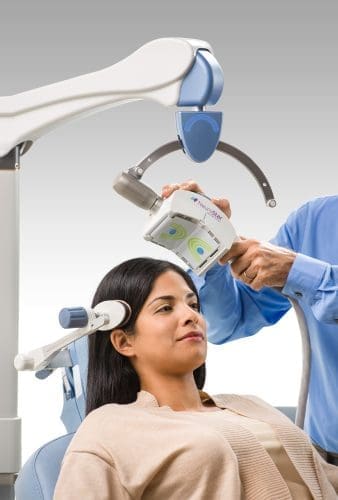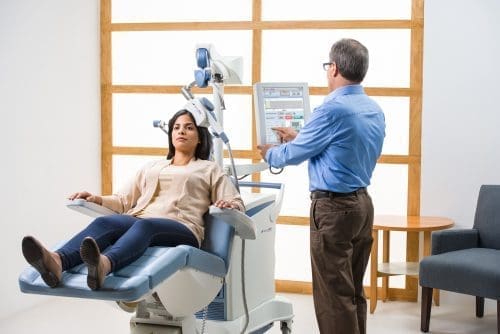Transcranial Magnetic Stimulation (TMS)
Is your adolescent, teen, or young adult struggling with treatment-resistant depression or major depressive disorder (MDD)? Have the treatments you've tried for their mental illness just not worked? Transcranial magnetic stimulation (TMS), also known as repetitive TMS (rTMS), which involves administering repetitive electrical pulses, could be the therapy your son or daughter needs to heal.
What Is TMS Therapy?
TMS therapy is a safe, low-risk, and noninvasive form of magnetic brain stimulation treatment that requires no post-treatment downtime. Transcranial magnetic stimulation can be used when other medications have not been effective for issues like treatment-resistant depression.
What Does TMS Therapy Treat?
At Embark Behavioral Health, our TMS treatment serves young people with treatment-resistant depression and major depressive disorder.
TMS therapy can be effective for treatment-resistant depression and major depressive disorder because it targets areas of the brain associated with depression symptoms, such as low mood, suicidal ideation, lack of motivation, and decreased pleasure. By stimulating these areas with magnetic fields, TMS treatment can improve the release of serotonin and dopamine, which are involved in regulating mood. The result can be better mood and quality of life.
Who Can Benefit From Our TMS Treatment?

TMS therapy at our Campbell, California clinic serves young adults ages 18-25 and, in special treatment cases, adolescents and teens ages 14-17, pending psychiatric approval. For young people who’ve found treatment such as medication and talk therapy did not successfully address major depressive disorder and depression, our TMS treatment could help.
If you’re interested in TMS therapy and want to know if your adolescent, teen, or young adult may have depression symptoms that TMS could treat, take our survey.
How Does TMS Work?
TMS treatment works by placing electromagnets on specific, targeted positions on the head to create magnetic fields that stimulate the nerve cells in the brain. According to a study published by the National Library of Medicine, these magnetic fields generate electric pulses that activate regions in the brain believed to regulate mood. Specifically, TMS therapy works by using the prefrontal cortex to target and treat issues like treatment-resistant depression and major depressive disorder.
At Embark Behavioral Health, our high standards of treatment ensure that we administer all TMS services with compassion and skill. We provide this treatment alongside therapy in an outpatient clinic setting.
Is TMS Therapy Effective?
Some studies have found TMS therapy to be a promising treatment for challenges like treatment-resistant depression and major depressive disorder. For example, a Journal of Affective Disorders study showed up to an 83% response rate (experiencing noticeable relief) and up to a 62% remission rate for those who’ve tried medications and have not experienced the desired results for conditions like depression.
According to another study published in the Journal of Affective Disorders, transcranial magnetic stimulation has been shown to drive up remission rates (nonexistent or minimal depressive symptoms) in those with major depressive disorder.
Further evidence that rTMS is successful is seen in reduced rates of self-injury and suicidal behavior, reduced hospital visits and inpatient stays, improved social functioning, and being less likely to drop out of treatment. Evidence of this can be seen in a study published in Frontiers of Psychiatry that showed how TMS treatment can successfully reduce the rates of suicidal thoughts.
These findings suggest that TMS has a significant overall success rate for treating depression-related mental health challenges, and ongoing research continues to explore its potential for a wide range of psychiatric conditions.
What will TMS treatment be like?

Treatment overview
- During treatment, a cushioned coil is placed against the head, releasing a slight warming sensation.
- Sessions are typically 18 to 45 minutes each.
- Your child can relax and read a book or use their phone as treatment takes place.
- TMS treatment is a non-drug, noninvasive treatment, so your son or daughter can get back to their day and normal activities right away.
- Your adolescent, teen, or young adult will receive up to five 20-minute treatments a week for six to nine weeks as symptoms from treatment-resistant depression and major depressive disorder are relieved.
Post-treatment analysis
- Our specialists will analyze the results of treatment and make recommendations for next steps based on your child’s progress.
Signs TMS Therapy Could Help
Here are five signs that can help you decide if TMS treatment is right for your son or daughter.
Unsuccessful Results From Antidepressants
If medication has not successfully treated your adolescent, teen, or young adult’s depression or major depressive disorder, TMS therapy may help them overcome these challenges.
No Remission From Symptoms
As your son or daughter has increasing amounts of unsuccessful treatments using medication, the chance of going into remission from symptoms can decrease. TMS treatment may help your adolescent, teen, or young adult return to normal functioning and overcome difficult mental health challenges where other treatment options have failed.
Negative Side Effects From Medication
If your child has had extreme negative side effects from medications, such as depression or suicidal thoughts, TMS therapy may be a safer option.
Not Wanting To Use Medications
If you feel medications such as antidepressants just aren't right for your son or daughter, TMS therapy could be an excellent next step.
Diagnosis of Major Depressive Disorder or Treatment-Resistant Depression
If your adolescent, teen, or young adult is struggling with major depressive disorder or treatment-resistant depression, rTMS could be a helpful treatment option.
Insurance for TMS
TMS treatment at Embark is covered by most major insurance plans for young adults ages 18-25. For adolescents and teens ages 14-17 looking for TMS treatment, our team can discuss payment options with your family.
If you’re interested in verifying your insurance for TMS treatment, you can get started today!

TMS Therapy FAQ
TMS Therapy at Our Campbell, California Clinic
If your adolescent, teen, or young adult is struggling with treatment-resistant depression or major depressive disorder, our TMS treatment options may be the next step that your child needs to create a life filled with joy. Contact our Campbell outpatient clinic team and learn if TMS is right for your son or daughter.











